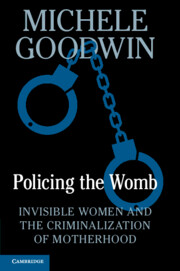Book contents
- Policing the Womb
- Policing the Womb
- Copyright page
- Dedication
- Contents
- Preface
- Acknowledgments
- 1 Introduction
- 2 Pregnancy and State Power
- 3 Creeping Criminalization of Pregnancy across the United States
- 4 Abortion Law
- 5 Changing Roles of Doctors and Nurses: Hospital Snitches and Police Informants
- 6 Revisiting the Fiduciary Relationship
- 7 Creating Criminals: Race, Stereotypes, and Collateral Damage
- 8 The Pregnancy Penalty: When the State Gets It Wrong
- 9 Policing Beyond the Border
- 10 Lessons for Law and Society: A Reproductive Justice New Deal or Bill of Rights
- 11 Conclusion
- Epilogue
- Notes
- Select Bibliography
- Index
2 - Pregnancy and State Power
Prosecuting Fetal Endangerment
Published online by Cambridge University Press: 07 February 2020
- Policing the Womb
- Policing the Womb
- Copyright page
- Dedication
- Contents
- Preface
- Acknowledgments
- 1 Introduction
- 2 Pregnancy and State Power
- 3 Creeping Criminalization of Pregnancy across the United States
- 4 Abortion Law
- 5 Changing Roles of Doctors and Nurses: Hospital Snitches and Police Informants
- 6 Revisiting the Fiduciary Relationship
- 7 Creating Criminals: Race, Stereotypes, and Collateral Damage
- 8 The Pregnancy Penalty: When the State Gets It Wrong
- 9 Policing Beyond the Border
- 10 Lessons for Law and Society: A Reproductive Justice New Deal or Bill of Rights
- 11 Conclusion
- Epilogue
- Notes
- Select Bibliography
- Index
Summary
For all the important and even urgent attention to reproductive rights, focused on preserving abortion access in an era of political and judicial backlash, far less advocacy protects the interests of women who wish to remain pregnant. That is, abortion rights are the primary focus of reproductive privacy advocacy movements in the United States and have been for some time. Arguably, abortion has become so fundamentally intertwined linguistically and conceptually with the terminology of “reproductive privacy” and “reproductive rights” that little else fits within the taxonomy. One might even argue that the right to be free from government intervention in pregnancy has been excised from the framework of reproductive rights altogether, as some feminist scholars now refer to pregnancy preference as “birth activism” rather than as a part of the bundle of rights framed within reproductive privacy. Pro-choice, or even to exercise choice, within this narrow conception of reproductive rights serves only to affirm an abortion right. The reductive meaning of having choice is the ability to exercise agency over pregnancy termination. Unfortunately, this approach to reproductive rights suffers significant blind spots; it ignores the spectrum of reproductive health decisions a woman makes and in which she can be subjected to state power.
Keywords
- Type
- Chapter
- Information
- Policing the WombInvisible Women and the Criminalization of Motherhood, pp. 12 - 27Publisher: Cambridge University PressPrint publication year: 2020

